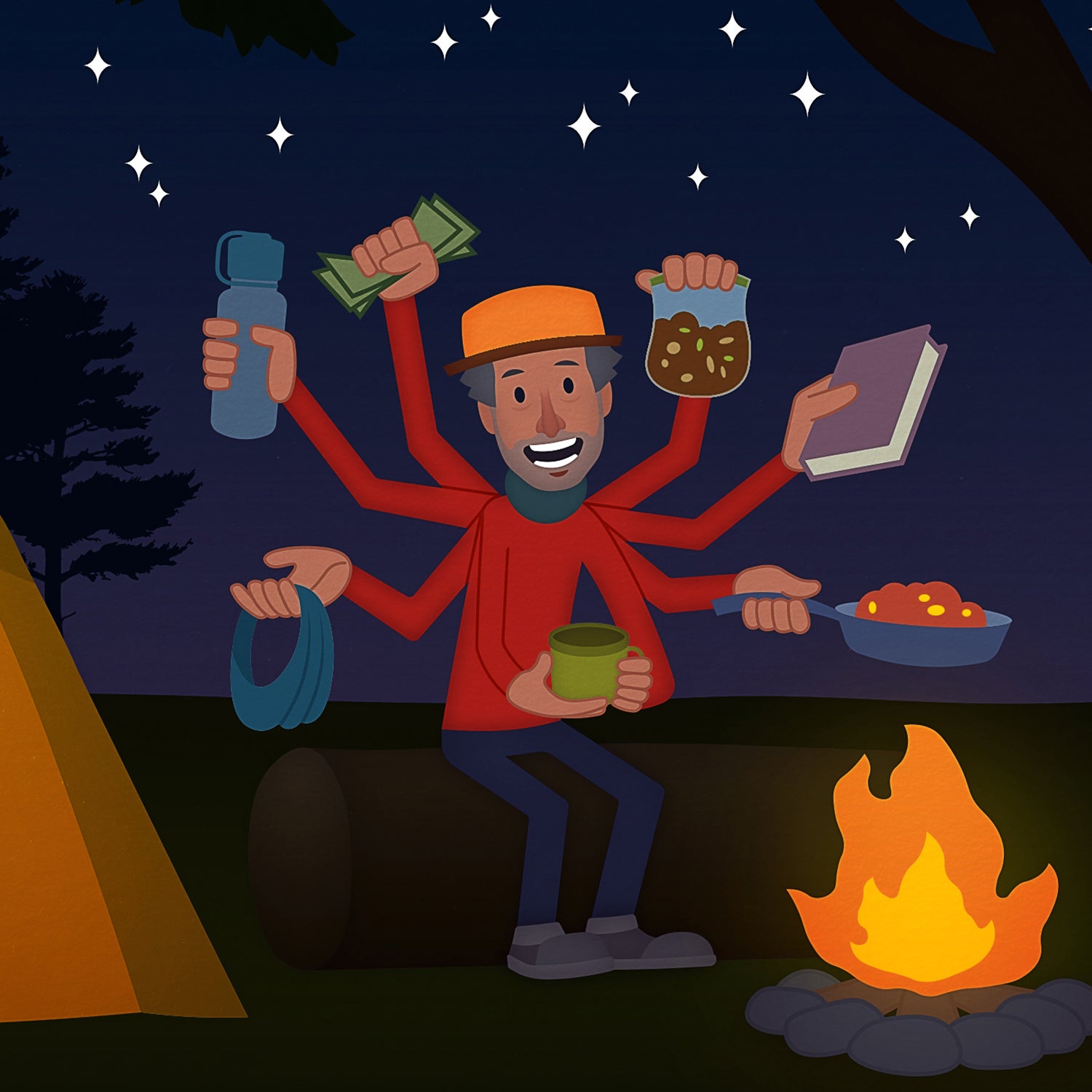Every afternoon near the start of my first thru-hike, I knew just where IтАЩd find the hiker named PonchoтАФand that heтАЩd greet me with advice that would help me finish the Appalachian Trail.
A few years earlier, Poncho, a fifty-something auto mechanic from Boston, had found his real home (and that nickname) on the Appalachian Trail. He had fallen in love with the pathтАЩs subtle majesty and social fabric. Early each spring, heтАЩd return to Georgia to start his annual pilgrimage up through the other side of his home state, Massachusetts, en route to the trailтАЩs northern endpoint. Poncho had become something of an idiosyncratic guru in the process, an intriguing hiker who would slip out of shelters long before dawn and stop in the midafternoon 20 miles up trail to build a fire and rest for the following dayтАЩs long walk.
A compact and wiry man with an exquisite salt-and-pepper beard, Poncho seemed to glow when he talked about the Appalachian Trail, proselytizing on its virtues like heтАЩd unlocked the meaning of life. Whenever I lumbered into camp, hours after his arrival, heтАЩd be warming his toes and drying his reptilian by the fire. He always offered friendly words of welcome: тАЬHey kid, you got what it takes,тАЭ he once yelled, his Boston accent scuffed by a longtime love of Black & Mild cigarsтАФthe first thing heтАЩd seek out in every trail town. тАЬNow you just gotta learn to tolerate ╛▒│┘!тАЭ
But Poncho had more than motivational mantras. He would tell my fledging trail family of thru-hikers╠¤about learning to carry only enough water to make it to the next stop, or figuring out how much food to tote to avoid the dreaded тАЬhanger.тАЭ╠¤He taught us about good hostels and great restaurants, difficult sections and daily routines. WhatтАЩs more, his lessons tacitly acknowledged that long-distance hiking was an endless educational process, so it was OK if we rookies didnтАЩt have all the answersтАФwe had plenty of time and miles to discover them.
Poncho eventually sped ahead, churning out 30-mile days while we were still inching toward 25. But I would occasionally spot a five-toed footprint in the mud, certain it was his. (HeтАЩs still the only hiker IтАЩve ever met who swore by the things.) I continued following PonchoтАЩs toes north, trusting that I was indeed learning to tolerate it.╠¤
IтАЩm still no expert in thru-hiking, and IтАЩm not sure such a thing exists. Nevertheless, IтАЩve combined a bit of PonchoтАЩs wisdom, a bit of my own, and much IтАЩve acquired from other trekkers into ten pointers that, if youтАЩre new to thru-hiking this year, may help you along your way. You got what it takes, kid.
Tips for Beginner Thru-Hikers to Nail Your First Trail
1. Buy a Buff. Get creative with how you use it.
Since the benchmark for backpacking gear holds that every item you carry should have at least two uses, the humble тАФthat is, the ubiquitous brand of the common neck gaiterтАФis worth its weight in gold. Cold? Put it over your face, and let your nose and mouth warm you. Hot? Wrap it around your neck to shield sun and wick sweat. If youтАЩre willing to get creative, it can function as underwear, a bra, a pillowcase, a camp towel, a rag, a mask, a wound wrap, and a dozen other things.
2. Always swim. YouтАЩll never regret it.
During any long hike, as in life, you will make endless choices, and each decision will bend your metaphorical and literal paths in unquantifiable ways. So donтАЩt let regret become part of your thru-hiking. Perhaps the only moments I regret from every thru-hike are the instances when I decided not to swim. From the glacial lakes of the High Sierra to the natural springs of sunny Florida, swimming during long hikes is a chance to pause and enjoy being present in nature without the weight of walking. I think about my dips in Virginia creeks or raging California rivers often. But I also remember times when I decided against it, for fear of not making milage goals, or being wet and chafed, or encountering snakes swimming in my vicinity. I would take them all back if I could. If you are thru-hiking, you are grinding, and you also stink; take this moment for yourself, and get in the water already.
3. Listen to audiobooks. Physical books are heavy.
The paperback edition of the of Karl Ove KnausgaardтАЩs epic life chronicle, , weighs 14 ounces. Like an absolute idiot, I carried that tome during my first thru-hike, finished it, and had a family member dispatch the fourth volume (which weighs even more) to a trailside post office. Then a fellow hiker told me about , an app I could link to with my library card for free audiobooks. Sans paper book, my pack weighed nearly a pound less. I realize the notion of walking silently through woods by day and curling up fireside with a book by night is romantic; I also know that, given the exhaustion of thru-hiking, itтАЩs nearly impossible to do. You will spend plenty of time with your own thoughts on trail as is, so give yourself a mental break from yourself by spending some time listening to a great writerтАЩs thoughts instead. Whatever you hear will make your banter with fellow hikers better too.╠¤
4. Hide some cash from yourself.
Sure, itтАЩs totally possible to budget a thru-hike in advance and stick to your financial script. But itтАЩs much more common to overshoot your budget. Thru-hikes are thrilling in part because they are continual highlight reels of the unexpected, but that can mean unexpected expenses, from broken hiking poles to a desperate hotel stop in awful weather. IтАЩve seen several fellow hikersтАЩ trips end when their money ran out on the trail. Set your budget, then add another 20 percent. Give that surplus to a trusted friend or family member, and ask them to send it only if you really need it. Best-case scenario? You reach your terminus and come home to a financial cushion.
5. DonтАЩt judge other thru-hikers by first impressions.╠¤
Maybe you think, as I first did, that thru-hiking involves a quiet communion with nature, void of the masses. Ha! If you start a popular trail at a busy time, the vibe will be more spring break than social fast, and youтАЩll meet dozens of new people every day. DonтАЩt trust every first impression you getтАФI initially scoffed at fellow travelers who soon became (and remain) some of my very best friends, a process thatтАЩs taught me to be more open off-trail, too. And remember: youтАЩre all walking along the same squiggly line for months, so the person you alienate today might be the person from whom you need help tomorrow. DonтАЩt be an ass, even though the trail will inevitably make you cranky.
6. Think about your water consumption, a lot.
YouтАЩll hear this axiom a thousand times on trailтАФone liter of water weighs two pounds, so carry it judiciously. But a liter of water actually (or four more ounces, the weight of two full-size candy bars), meaning itтАЩs critical to be wise about the water you haul. The more you minimize the water you carry, the more you minimize the strain on your body, making it that much easier to walk across a country. Your goal should be to arrive at the next water source with a swallow leftтАФno more, no less. The prospect of dehydration is real, but water reports or will show you refill opportunities ahead. Learn to ride that line, and your days will only get better. (Also, filtering water is a pain in the ass, but so is giardia.)
7. Make your own trail mix.╠¤
Since youтАЩre not going on a day hike where store-bought trail mix is readily available, and because youтАЩre essentially behaving like a professional athlete by working out all day, make your own. Buy an enormous, durable freezer bag and refill it with the salty things you love at each resupply, changing the blend as you go. My recent trail-mix formula included salt-and-vinegar pistachios, , , and that almighty thru-hiking staple with : FlaminтАЩ Hot Cheetos. Stuff a smaller bag full of sweets into your hipbelt pocket for bursts of sugary energy as you walk. YouтАЩll save money and perhaps enjoy eating it more.
8. Try new foods, even if no one else will.
Some hikers thrive on eating the same tried-and-true foods every day without fail. They know how much tuna, ramen, and tortillas cost and weigh and how each food tastes and feels in the belly, and these hikers donтАЩt want to risk the consequences of failed experiments. With all due deference, thatтАЩs nonsense. ThereтАЩs going to be enough monotony in your life, whether itтАЩs the green tunnel of the Appalachian Trail or the sage bushes of the desert. Pick up one or two new things at every resupply, even if itтАЩs just a different dehydrated food packet, and youтАЩll have a little diversion waiting for you at every meal. Skip the Dollar General, too, and go to whatever mom-and-pop shop you can find. Try regional candies and chipsтАФTennessee wins with the former, Pennsylvania the latter. Try different brandsтАЩ takes on the same item. And if the food is awful, ketchup fixes everything. (Never leave town without condiment packets, the culinary Band-Aids of distance hiking.)
9. Get curious about where you are.
I suppose it is possible to walk from Georgia to Maine or from Mexico to Canada and think only about the placement of your feet and nothing else. But that seems like a pretty boring way to exist, especially when youтАЩre exploring new territory that can teach you so much. Google the national forest where youтАЩre living for the next few nights or the tiny town that has a great hostel. Learn in real time. Harpers Ferry isnтАЩt just where you get your picture taken at the тАЬemotional midway pointтАЭ of the Appalachian TrailтАФitтАЩs one of the most crucial crucibles of American history (and not only because of ), so read the National Park System signs. The Nantahala Outdoor Center in North Carolina isnтАЩt just a place to get a burger and shower before climbing into the SmokiesтАФit was a , another national sin with which weтАЩve barely reckoned. A thru-hike is a rare chance to walk through history, so take the time to immerse yourself in it.
10. You can do this. ItтАЩs fine if you decide you donтАЩt want to do this, too.
There will be days when you want to quit, when you are certain you are wasting six months of your life on a selfish, stupid, stinking journey that is only making you miserable. There will be days when you ache, and you are certain that hiking could break your body. I have been there, and I will return soon enough. I know it can suck, but keep going. Thru-hiking requires few special skills or spectacular athletic abilities, but it requires surfeits of toughness, gumption, and grit. If you donтАЩt have them now, you will by the time you reach your finish.
Also, donтАЩt forget thru-hiking is your choice. If itтАЩs only making you miserable, stop. ThatтАЩs OK too. I firmly believe that trekking for extended periods of time is a way to change your mind, life, and body, mostly for the better. But there are other ways to get similar results, so itтАЩs fine if thru-hiking isnтАЩt your route to enlightenment, or whatever. Just walk long enough to know that youтАЩre done, and try, as best as you can, never to look back with regret.╠¤


